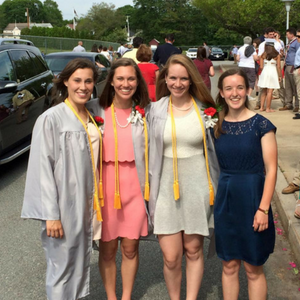Why I Love Catholic Schools

Theresa Gallagher (far right) and friends at her graduation from Bishop Stang High School in 2015.
It has been three years since I graduated from a Catholic high school and I still often reflect on my high school experience. Little things prompt memories of the simple experiences which made that time so special: the teacher who would stand outside of his classroom door every morning to greet arriving students, the English teacher who inspired me to allow literature to spark moral growth, the group of students and teachers who would gather early in the morning to celebrate Mass before classes began. However, it took a college class on the philosophy of Catholic education to help me realize that my high school lived out its Catholic identity through these small, concrete practices.
That college class provided me the language to express what I implicitly knew from my high school experience; being a Catholic school does not mean operating exactly like any other school with the added requirement of a theology class. Rather, being a Catholic school entails allowing Christ to permeate all aspects of the educational endeavor from the chemistry classroom to the sports’ fields. The more I read and reflected on the mission of Catholic schools, I began to see them as beautiful and totally unique. Here are just a few reasons why I love Catholic schools:
Finding Human Dignity in Our Divine Destiny
Every school, secular or religious, possesses an underlying vision of what it means to be human. Each school’s understanding of human nature then determines what and how it chooses to teach. Catholic schools look to Christ and the Catholic Tradition for what it means to be a human person. This foundation then informs how they educate their students. Christ reveals to mankind that we have an inherent dignity simply because God desires to enjoy eternal communion with us. Our dignity does not come from anything we do. As humans, we are creatures that God created, not for his own benefit, but out of love, and He calls us to a divine destiny. Catholic schools are built upon this vision of humanity and seek to foster an authentic appreciation for the dignity of every person.
Educating the Whole Person
Given that humans have a divine origin and destiny, we must acknowledge this fact when educating if we want to offer a truly holistic education. Education is more than imparting facts. It’s about forming young people so that they might flourish. To do this, Catholic schools cultivate all aspects of humanity: intellectual, spiritual, physical, social, etc. By recognizing that humans possess a spiritual component and nurturing it alongside the other aspects of humanity, Catholic schools allow students to live an integrated life. Faith and academics, the spiritual and the intellectual, go hand in hand. They should not be segregated to unrelated realms of life.
Calling Students to Lives of Service
Many schools, religious or not, promote the ideal of service. But service in a Catholic school is not simply an item to check off of a list. It is essential to our understanding of what it means to be human beings created in the image and likeness of God. God himself is a communion of persons within the Trinity. The Father and the Son constantly give themselves totally in love to each other. Students in Catholic schools have the opportunity to learn from God’s own example that it is in giving ourselves in love that we are conformed to God’s image. This rich understanding of service provides students the motivation to undertake lives of charity rooted in much more than the desire to build their resumes. It prepares them to serve their families and human society while always remaining focused on their eternal destiny in heaven.
Fostering Communities of Holiness
When united by faith and led by teachers who seek to bear witness to Christ, Catholic schools cultivate communities of love. Students, whether Catholic or not, implicitly sense their dignity from the first moments of stepping into the school. Regular celebration of the Sacraments further unites the school community and creates a climate in which students can more easily choose goodness and holiness. Such communities offer a powerful witness to Christ’s presence in the world.
While I recognize that no Catholic school perfectly lives out these ideals, is it not better to imperfectly strive after them rather than disregard them?
“Education is not given for the purpose of gaining power but as an aid towards a fuller understanding of, and communion with man, events, and things. Knowledge is not to be considered as a means of material prosperity and success, but as a call to serve and to be responsible for others.”
—The Catholic School(56)
About the Author:
Theresa Gallagher is a Bishop Stang High School graduate of the class of 2015. She is currently a junior History and Theology Major at the University of Notre Dame. This summer she is working as an intern for the Catholic Schools Office. She hopes to work in Catholic education in some capacity after graduating.
